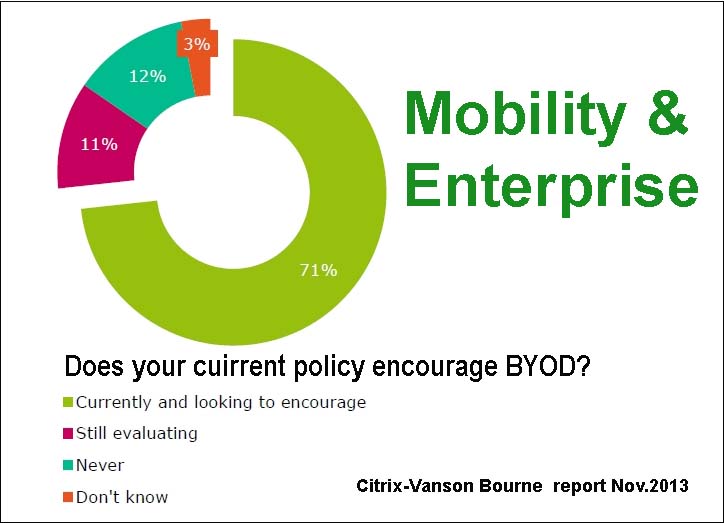
November 7, 2013: A global survey commissioned by Citrix, finds that 71 percent of enterprises believe mobility is a top priority for their business and 63 percent believe it to be the greatest factor in helping their organization gain a competitive advantage.
Of the organizations surveyed, approximately half have implemented technologies to support mobile devices, with 48 percent using mobile device management (MDM) and 47 percent using mobile application management (MAM). Organizations are also recognizing the need to provide Windows apps and desktop to mobile workers, with 41 percent of businesses using or planning to use application virtualization and 40 percent leveraging desktop virtualization. In addition, file sharing, sync and storage have been or will be implemented by 40 percent of companies to support mobile users.
The Citrix Mobility in Business Report polled a total of 1,700 senior IT decision-makers across 17 countries. Respondents were asked about the advantages and challenges of implementing mobile initiatives, their current policies toward mobile devices and the impact that the consumerization of IT is having on their businesses. The report outlines results from the research and sheds light on the perceptions of mobility, its importance for companies and its perceived impact for improving flexibility, productivity and agility.
Other notable findings:
The top two mobile initiatives for businesses are increasing development on mobile apps and increasing adoption of secure file sharing and collaboration tools. Improving network performance and access is the third most important mobile initiative.
51 percent of organizations say they are changing management processes to better manage those working on any device from anywhere.
Organizations are most focused on measuring the impact that mobility has on productivity and employee motivation.
Bring Your Own Device (BYOD): BYOD is quickly becoming the norm, with 71 percent of companies allowing, accommodating and encouraging the use of personally owned devices. Of these companies, 76 percent estimate that more than 100 unidentified devices access their networks each day. Worldwide, organizations report a daily average of 425 such connections, with the highest figures from businesses in Brazil (994), Canada (649) and Japan (618).
Mobile Platforms: The research reveals that enterprises are embracing a variety of mobile platforms. Android is by far the most popular platform according to respondents, with 72 percent saying they support or are planning to support Android this year, and another 65 percent seeing an increased use of Android in their organization. Apple iOS remains popular, with 54 percent supporting or planning to support the platform, and 48 percent seeing an increase in its use from last year. Microsoft Windows 8 has become more popular than Windows Mobile, with 46 percent of companies supporting or planning to support the full-featured operating system, compared with 32 percent for the mobile version. BlackBerry still retains a significant presence, supported by 35 percent of companies, though only 18 percent have seen an increase in its use since last year.
Impact of Consumerization of IT: The survey findings also reveal the impact that consumer-orientated technologies continue to have on the workplace. According to the report, 29 percent of the global workforce is now believed to be using their own mobile apps for work purposes. Globally, the most popular mobile apps being demanded by employees are sales, CRM or database related, with 48 percent reporting such a trend. Other popular apps include employee intranet portals (46 percent), messaging applications (43 percent), social media platforms such as Facebook, Twitter and LinkedIn (43 percent), and file sync and sharing platforms (41 percent).
Findings on mobile applications:
Exactly half (50 percent) of organizations surveyed said that the acquisition of mobile apps would be a mixture of in-house development and off-the-shelf purchases, while a quarter said they would rely purely on off-the-shelf purchases for mobile apps.
Nearly one in five (17 percent) organizations said they would acquire applications strictly through in-house development, while 8 percent were not sure how they would acquire applications.
Overall Findings: The results of this survey show that in just a few years, mobility has become a top priority for businesses around the world. Companies have moved quickly to identify the business values of mobility, develop strategies and policies to harness it, and implement the technologies needed to support it. Employees have responded enthusiastically, embracing the freedom to work the way they want – anywhere, on any device – to achieve higher productivity and satisfaction.
The “Mobility in Business” report was compiled by UK based independent specialist in market research Vanson Bourne on behalf of Citrix, with the aim of creating a global snapshot of mobility in business across the globe. The report draws on data from 1,700 senior IT decision makers in 17 countries to create an uncompromising and informative investigation of preparedness for and attitudes towards mobility. Responses came from IT leaders in the UK, USA, Canada, China, India, Brazil, Russia, France, Germany, Denmark, Sweden, Australia, Singapore, Japan, South Korea, Thailand and Taiwan.
You can find the full report here